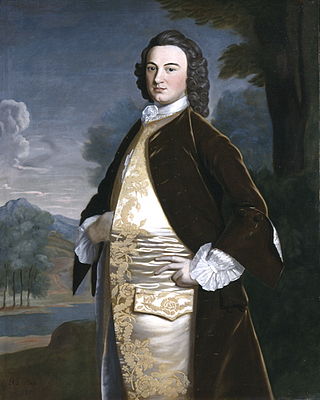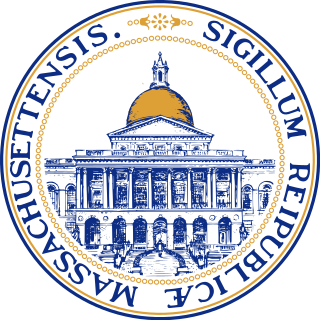Massachusetts law required a majority vote, necessitating additional votes if no one won a majority. This was necessary in 4 of the districts.
| Elections in Massachusetts |
|---|
 |
| Party | Candidate | Votes | % | |
|---|---|---|---|---|
| Pro-Administration | 6 elected | 6,232 | 54.4 | |
| Anti-Administration | 2 elected | 5,228 | 45.6 | |
In the fourth district,
The first election in the district was in part a reflection of the rivalry between Hampshire and Berkshire counties. Berkshire was the less populous county, but four of the six candidates who received the most votes - Theodore Sedgwick, William Whiting, Thompson J. Skinner, and William Williams - were residents of the county. The two Hampshire candidates were Samuel Lyman and John Worthington. The first election did not reflect the fact that the two counties were centers of agrarian discontent and of support for Shays's Rebellion. Nor did it reflect the fact that in the state Convention the Hampshire delegates voted 32 to 19 and the Berkshire delegates voted 16 to 6 against ratification of the Constitution. Only Whiting was regarded as a Shaysite and an Anti-Federalist, while the other five men were Federalists - and two of these - Worthington and Williams - had been virtual if not actual Loyalists during the Revolution. The issue of amendments to the Constitution was not raised during the first election in the district, but it became so important in the ensuing elections that Theodore Sedgwick, who opposed amendments, publicly promised to support them before the fifth election, which he won.
— The Documentary History of the First Federal Elections: 1788-1790. Vol. I. p. 603.
In the fifth district,
The only problem was whether Partridge could retain his post of sheriff of Plymouth County and accept a seat in Congress, as he had done in 1779-1782 and 1783-1785. He received a certificate from Governor Hancock on 10 January notifying him of his election. Partridge wrote three letters to the Governor. In the first, which he apparently did not send, he refused the appointment. He accepted in the two following letters but explained that he would not take the seat if he had to give up his post as sheriff (12, 20 January, 23 February). The issue of whether or not a state officeholder could retain a state post and still serve in Congress had been and would be raised in other states. On 12 February Governor Hancock asked his Council for advice about Partridge and about George Leonard, judge of probate in Bristol County, who had been elected to Congress from the Bristol-Dukes-Nantucket District. The Council replied in writing the same day that it was 'inexpedient' for a man to hold the office of judge of probate and a seat in Congress, but that it did not find anything in the state constitution which prevented a sheriff from also being a member of Congress. The Council advised, however, that it would be inexpedient to introduce the practice of sheriffs being absent for long periods although Partridge 'may at present be indulged' and take a seat in Congress 'consistently with the safety of that county' (Council Proceedings, Thursday 12 February, M-Ar). The next day Governor Hancock sent the Council's written reply to the legislature and asked for its advice (13 February, Miscellaneous Legislative Documents, House Files, M-Ar). The two houses appointed a joint committee which wrote a report that was approved and sent to the Governor on Monday, 16 February. The legislature declared that if George Leonard continued to hold the office of judge of probate and also took a seat on Congress, any future legislature would address the Governor authorizing him and the Council to appoint another person judge of probate in Bristol County. But the legislature refused to give advice about George Partridge. It pointed out that sheriffs served during the pleasure of the governor, and (with the advice of his Council) were removable by him at any time. Sheriffs were not removable in any other way except through impeachment by the House and a trial before and conviction by the Senate. Therefore the House and Senate declared that intervention by the legislature was 'neither necessary or proper; and from the conduct and advice of your Council, they see no reason to doubt the wisdom of that constitutional provision' (House and Senate Proceedings, 13, 14, 16 February).
— The Documentary History of the First Federal Elections: 1788-1790. Vol. I. pp. 575–76.
In the eighth district,
It was evident before the elections were completed in Worcester District that a candidate who did not support amendments to the Constitution had no chance of winning. The three leading candidates in the three Worcester District elections were Jonathan Grout, Timothy Paine, and Artemas Ward. Grout, a local leader during the Revolution, had voted against ratification of the Constitution and in 1788 was a member of the legislature. Paine, a prominent officeholder in the county for two decades before the Revolution, had been appointed to the Royal Council in 1774. Unlike most 'mandamus councillors,' he did not become a Loyalist. By 1788 he had regained much of his influence in the town of Worcester. Ward had been appointed commanding general of Massachusetts troops after Lexington and Concord, he remained in charge until George Washington was appointed commander-in-chief of the Continental Army in July 1775. The popular Ward resigned his commission in April 1776 and returned to state politics. The past records of these three men did not become a public issue until shortly before the third and final election.
…
AS in the two previous election, the two Worcester newspapers, with one exception, printed nothing until their last issues before the election on 2 March. The exception consisted of two items (one of which supported Timothy Paine) in the Massachusetts Spy on 19 February. Then on 26 February the Massachusetts Spy published five articles. Two of them supported Jonathan Grout, one supported Artemas Ward, one backed Timothy Paine, and the fifth did not mention any names. On the same day the American Herald published four items. One supported Grout, one opposed Paine because he had been a mandamus councillor, and the other two items urged that he be elected. The issue of Paine's appointment as a mandamus councillor by the British government in 1774 had been brought up for the first time by the Boston Independent Chronicle, 12 February, and not by the Worcester newspapers. Despite the ambivalence of the newspapers, there was a considerable increase of interest, for the vote almost doubled over the first election on 18 December 1788: from 1,886 to 3,484. Grout was elected Representative by a decisive majority. Artemas Ward, who ran a poor third in each of the three elections, finally defeated Grout in the election to the second Congress in 1791. Paine was elected to the state House of Representatives in 1789.— The Documentary History of the First Federal Elections: 1788-1790. Vol. I. pp. 601, 676.
| District | Result | Candidates [1] |
|---|---|---|
| Massachusetts 1 | Pro-Administration win | √ Fisher Ames (Pro-Administration) 818 votes (50.7%) Samuel Adams (Anti-Administration) 521 votes (32.3%) Samuel A. Otis 70 votes (4.3%) Charles Jarvis 45 votes (2.8%) Benjamin Austin 43 votes (2.7%) John Adams (Pro-Administration) 30 votes (1.9%) Others 86 votes (5.3%) |
| Massachusetts 2 | Pro-Administration win | First ballot(December 18, 1788): Benjamin Goodhue (Pro-Administration) 567 votes (38.6%) Jonathan Jackson (Pro-Administration) 392 votes (26.6%) Nathan Daneseg 295 votes (20.1%) Samuel Holten 202 votes (13.8%) Scattering: 13 votes Second ballot(January 29, 1789): √ Benjamin Goodhue (Pro-Administration) 1,491 votes (67.0%) Jonathan Jackson (Pro-Administration) 724 votes (33.0%) Scattering 7 votes |
| Massachusetts 3 | Anti-Administration win | First ballot(December 18, 1788): Nathaniel Gorham 536 votes (36.4%) Elbridge Gerry (Anti-Administration) 384 votes (26.1%) Joseph Bradley Varnum (Anti-Administration) 254 votes (17.2%) John Brooks (Pro-Administration) 106 votes (7.2%) James Winthrop 50 votes (3.4%) Loammi Baldwin 43 votes (2.9%) Scattering 100 votes (4.4%) Second ballot(January 29, 1789): √ Elbridge Gerry (Anti-Administration) 1,140 votes (61.1%) Joseph Bradley Varnum (Anti-Administration) 366 votes (19.6%) William Hulberg 205 votes (11.0%) James Winthrop (Anti-Administration) 82 votes (4.4%) Ebenezer Bridge 52 votes (2.8%) Others 22 votes (1.2%) |
| Massachusetts 4 | Pro-Administration win | First ballot(December 18, 1788): Theodore Sedgwick (Pro-Administration) 835 votes (35.6%) Samuel Lyman (Pro-Administration) 330 votes (14.7%) William Whiting 302 votes (13.4%) Thomson J. Skinner (Anti-Administration) 256 votes (10.4%) William Williams 181 votes (8.7%) John Worthington 178 votes (7.3%) John Bacon 93 votes (4.1%) Second ballot(January 29, 1789): Samuel Lyman (Pro-Administration) 718 votes (31.0%) Theodore Sedgwick (Pro-Administration) 736 votes (31.7%) William Whiting 578 votes (24.9%) Thomson J. Skinner (Anti-Administration) 248 votes (10.7%) John Bacon (Anti-Administration) 39 votes (1.7%) Third ballot: (March 2, 1789) Samuel Lyman (Pro-Administration) 1,847 votes (32.9%) Theodore Sedgwick (Pro-Administration) 1,523 votes (30.6%) William Whiting 1,109 votes (22.9%) Thomson J. Skinner (Anti-Administration) 648 votes (12.8%) Fourth ballot: (March 30, 1789) Theodore Sedgwick (Pro-Administration) 1,649 votes (47.0%) Samuel Lyman (Pro-Administration) 1,382 votes (39.3%) William Whiting 468 votes (11.7%) Scattering: 64 votes Fifth ballot: (May 11, 1789) √ Theodore Sedgwick (Pro-Administration) 2,155 votes (50.2%) Samuel Lyman (Pro-Administration) 2,138 votes (47.8%) John Bacon 67 votes (1.3%) Scattering: 27 votes |
| Massachusetts 5 | Pro-Administration win | √ George Partridge (Pro-Administration) 501 votes (90.4%) Others 53 votes (9.6%) |
| Massachusetts 6 | Pro-Administration win | √ George Thatcher (Pro-Administration) 588 votes (62.1%) Josiah Thacker 182 votes (19.2%) Nathan Willing 73 votes (7.7%) Scattering 105 votes |
| Massachusetts 7 | Pro-Administration win | √ George Leonard (Pro-Administration) 710 votes (54.0%) Phanuel Bishop (Anti-Administration) 342 votes (26.0%) David Cobb (Pro-Administration) 241 votes (18.3%) Scattering 23 votes |
| Massachusetts 8 | Anti-Administration win | First ballot(December 18, 1788): Jonathan Grout (Anti-Administration) 665 votes (35.3%) Tim Paine 561 votes (29.8%) Artemas Ward (Pro-Administration) 284 votes (15.1%) Moses Gill 110 votes (5.8%) Abiel Wilder 71 votes (3.8%) John Sprague 63 votes (3.3%) Others 132 votes (4.9%) Second ballot(January 29, 1789): Tim Paine (Pro-Administration) 1,040 votes (45.4%) Jonathan Grout 990 votes (42.1%) Artemas Ward (Pro-Administration) 258 votes (11.3%) Others 27 votes (1.2%) Third ballot: (March 2, 1789) √ Jonathan Grout (Anti-Administration) 1,968 votes (55.7%) Tim Paine 1,312 votes (37.1%) Artemas Ward (Pro-Administration) 256 votes (7.2%) Scattering 18 votes |












